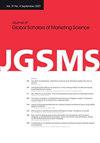Temporary love: A love-hate transition among luxury fashion consumers in a mediation of brand jealousy and moderation of value-expressiveness
IF 2.7
Q3 BUSINESS
Journal of Global Scholars of Marketing Science
Pub Date : 2023-08-15
DOI:10.1080/21639159.2023.2209104
引用次数: 1
Abstract
ABSTRACT There is a limited amount of research to investigate emotional transition (i.e. love to hate) among consumers. Moreover, can value-expressiveness motivate consumers to not to share negative word of mouth (NWOM) despite hating a brand? This study aims at addressing these important research questions. Survey-based data is collected from 413 Indian luxury fashion consumers and analyzed via structural equation modelling technique, using AMOS 27.0. Findings reveal that brand jealousy mediates the relationship between brand love and brand hate. Furthermore, when value expressiveness is low, the relationship between brand hate and negative word of mouth is stronger. Brand marketers should strengthen symbolic brand identity to sustain positive consumer-brand emotions. Moreover, some relationship dyads can be used to establish the brand image in a family-oriented, collectivist culture. The mediation of brand jealousy and the moderation of NWOM are unique contributions of this study in an Indian context.暂时的爱:奢侈时尚消费者在品牌嫉妒和价值表达适度之间的爱恨转换
摘要:目前对消费者情感转变(即爱与恨)的研究数量有限。此外,价值表达能激励消费者尽管讨厌某个品牌,但不要分享负面口碑吗?本研究旨在解决这些重要的研究问题。基于调查的数据收集自413名印度奢侈时尚消费者,并使用AMOS 27.0通过结构方程建模技术进行分析。研究结果表明,品牌嫉妒在品牌爱与品牌恨之间起中介作用。此外,当价值表现力较低时,品牌仇恨与负面口碑之间的关系更强。品牌营销人员应加强象征性的品牌认同,以维持消费者积极的品牌情绪。此外,一些二元关系可以用来在以家庭为导向的集体主义文化中建立品牌形象。品牌嫉妒的中介作用和NWOM的适度性是本研究在印度背景下的独特贡献。
本文章由计算机程序翻译,如有差异,请以英文原文为准。
求助全文
约1分钟内获得全文
求助全文

 求助内容:
求助内容: 应助结果提醒方式:
应助结果提醒方式:


